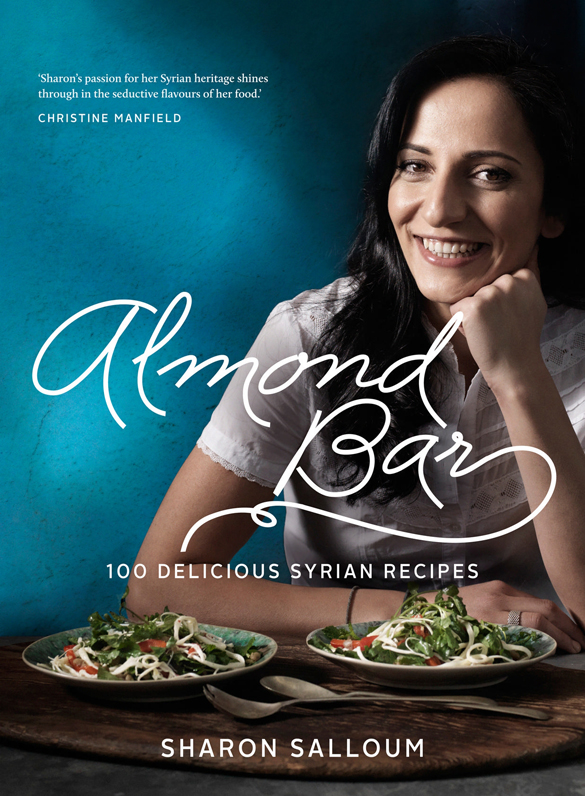
Sharon Salloum is co-owner and chef of Almond Bar restaurant in Darlinghurst. In her newly-published book, Almond Bar, she demystifies Syrian cuisine with a collection of 100 contemporary and classic recipes that are easy to replicate at home.
I first met Sharon briefly at Sydney Cellar Door in 2012 when I was intrigued by the presence of Syrian food at the outdoor wine festival. Earlier this year, I tasted some of her cuisine at the Souk Society Dinner. My intrigue was partly due to my heritage which includes a long line of able cooks, with repertoires spanning Armenian, Middle-Eastern, French and Italian cuisines. I’m no stranger to the intricate method of preparing kabab bil karaz, the anticipation of receiving barazek from a relative returning from Damascus, the breadth of Aleppo’s cuisine, and the first taste of freekeh at Beit Sissi in Aleppo. Sharon’s book is an inspiration to get into the kitchen and delve deeper into a culinary heritage I often take for granted.
In this interview, Sharon shares with me her love of cooking from a young age, her favourite creations and the influences and society’s changing attitudes to Middle Eastern cuisine.
~ ~ ~
Corinne: You learned how to cook from a very young age. What was the first dish that you prepared and as a child, did it reflect the style of food you enjoyed the most at the time?
Sharon: I clearly remember that the first food items I prepared as a child were cakes. One in particular that I was very proud of at the time was a checkerboard cake with chocolate ganache. I impressed myself given a cousin of mine would tease me about not being able to make anything that tasted good. I showed him. I absolutely adored baking at the time. I managed to convince my mum to let me bake most weekends. I spent my pocket money on cookbooks and generally opted to watch the one or two cooking shows on TV at the time over cartoons. I remember wanting to acquire knife skills like Yan from Yan Can Cook.
You travelled to Syria as a child. Which parts of the country did you visit and what food memories do you still cherish from those early years?
My mother, younger brother Steven and I went to Syria when I was 8 years old. We spent most of our time in Fayroozy, a town in Homs where my mother’s family lives and Zwaitineh, a village in Syria where my father’s family lives. We also spent a lot of time in Damascus, with one of my uncles and in neighbouring villages in Homs where we have other relatives. I loved the natural landscape of Syria, but admittedly what I remember most is the food. What is my favourite dish in the world Mukloubi, I had for the first time in Syria. It is a beautiful layered lamb upside down dish (and is in the book), that was made by my grandmother. My cousins and I sat around a large platter as children and shared the dish, spoon in hand and ready for battle. It was the most unforgettable meal id ever had. I also loved the barbecued birds caught during the hunting my cousins and uncles did in my father’s village. I loved the sweets and ice cream in Damascus and the shawarma was mouth-watering.
For the uninitiated, how does Syrian cuisine differ from Middle Eastern cuisine in general?
Without sounding biased, I believe that Syrian cuisine is more refined than that of our neighbours. We generally all share many dishes, but we all have our own particular ways of making them. This may mean a differing use of spices, sauces, the amount of salt or garlic in a dish etc. All these factors make a difference to the dish given they are simple and wholesome; you can actually taste the difference in how certain dishes are made and what ingredients are being used. Syria also utilises its Armenian influences in its cuisine, creating more spice mixes to suit its population than in other parts of the Middle East. Spices are an essential part of Syrian cuisine to the point that there are numerous baharat mixes in the different regions of Syria that are used.
Your book is a mixture of traditional Syrian recipes such as Kabab el Karaz and Barazek, and more contemporary ones that you have created. What influences have you used in your creations?
I am very much influenced by the traditional ingredients I have grown to know and love and appreciate a whole lot more now than I ever have. I am influenced a lot by the challenge of taking a traditional ingredient and thinking up the many ways it could possibly be used in a dish. I think this helps in teaching people more about these traditional ingredients. Further I am also very much influenced by what I love and feel confident will match well in a dish. I believe that if you are cooking something that you do not truly love, chances are that others won’t really show the dish a lot of love either. Therefore, I tend to be influenced by creating dishes that I feel I would really enjoy eating, myself. If I love making a dish, I think people are more likely to receive that when they dine.
Is there one dish that you are particularly proud of?
There is a few, however I would have to say one that has been received very well at the restaurant is a duck confit dish I created with moghrabieh (giant couscous), cabbage, shallots, Syrian fig jam and a pomegranate seed garnish. I had never put duck on the menu before, but it is certainly a very popular dish. It’s such a beautiful combination of traditional and modern, a dish that my relatives would probably wonder how I could create something so unorthodox and that’s what I love about it.
Syrians in general, particularly the people of Aleppo are very proud of their culinary heritage. Some are of the belief that one shouldn’t mess with traditional cooking. How do you think people in Syria would react to the evolution of their food abroad?
Judging by the way my relatives have reacted over the years to some of the ideas I’ve thrown at them or dishes I’ve created, I believe that in actual fact, Syrians would be quite impressed with how the cuisine has evolved. I certainly believe that some traditional dishes should not be touched or changed. We should in fact preserve them as much as possible. However, this doesn’t mean we can’t use traditional ingredients and use them in a more evolved sense, utilising modern cooking methods and possibly mixing it up sometimes and giving dishes their own names. For example I am about to put a variant of Fatteh on the menu. It will have the word Fatteh in the title, but it will have a clearer description in the title also. This is to show that I will not just call the dish Fatteh, but instead explain that it is more of a variant, not the original dish.
How do you think society is changing its attitudes towards Middle Eastern cuisine?
I think society is slowly growing a greater appreciation for Middle Eastern Cuisine. I think there is still a way to go with gaining a little more respect for the cuisine and seeing it as being more than just a fast food or in a wrap or served with garlic sauce and pickles. However, I love that people know what certain ingredients are and how they can be eaten or used. A few years ago, we struggled to get through our batches of labne, nowadays; I can hardly keep up with the demand. A few years ago, Pomegranate Molasses was a foreign ingredient. It’s just amazing to know how many people actually make hummus at home or use zaatar or sumac. I love it.
Your book, Almond Bar, demystifies Syrian cuisine by presenting with recipes that seem easy to replicate at home. Were there any challenges in adapting the recipes for a novice home cook?
Not at all. The best part about our kitchen at Almond Bar is that it’s almost set up in a way that its quite domesticated. Most Middle Eastern restaurant kitchens are the same. We don’t really utilise complex machinery or equipment in the cuisine and I’ve stuck by that over the years. The hardest part was to ensure my measurements were correct for the home cook. In a restaurant, batches tend to be bigger, and I cook with more feeling and innate understanding than with a measuring cup. I soon realised I couldn’t really have “a sprinkle of chilli flakes” as an ingredient description. Haha…
Do you have a favourite Syrian dish or meal that you would enjoy time and time again?
Mukloubi with lamb (as mentioned above) is my ultimate favourite. The other one I really love is Fattet Jej (layers of toasted bread, poached chicken, rice, yoghurt and tahini and cashews). I also thoroughly enjoy a good bowl of fattoush salad. It’s the perfect salad with any meal.
Where do you see Middle-Eastern cuisine heading in the next few years?
I’d like to see it move towards a smart casual flare. I think its slowly doing that a little at the moment given there are so many modern Australian cafes/restaurants utilising ingredients like sumac and tahini more with things like labne, falafel, hummus, baba ghanouj, muhammarra etc on their menus. I think with the emergence of the next generation of Middle Eastern chefs coming through, there will probably be a bigger move towards creating a more positive awareness of these ingredients and an appreciation of where they have come from.
With many thanks to Sharon Salloum for her time. Photo Credit: Rob Palmer – used with permission
~ ~ ~
You can meet Sharon Salloum and enjoy some delicious Syrian snacks, when she discusses her new book with Ardyn Bernoth, editor of Good Food at The Sydney Morning Herald.
When: Tuesday, September 17th, 2013
Time: 6.30 – 8.30 pm
Where: Berkelouw Books, 19 Oxford St, Paddington, 2021
Bookings are essential: ph 9360 3200, email: paddington@berkelouw.com.au
Cost: $8.50 which will be credited against any purchases on the evening.

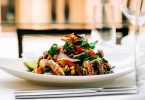

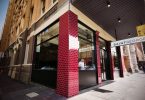
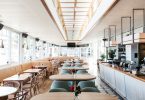
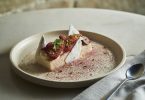
[…] Almond Bar brings a taste of Syria with a salad of fresh haloumi strips, watercress, lentils, chargrilled red capsicum and mint, a dish with a zing not unlike fattoush, another Middle-Eastern salad. […]
[…] is on at Sake Restaurant and Bar with cocktails and food made with the flowers. You can meet Sharon Salloum of Almond Bar restaurant and cookbook on Tuesday, September 17th between 6.30 – 8.30 pm at Berkelouw […]
[…] as Aston and 20 food stalls by some of Sydney’s popular restaurants such as Porteño and Bodegas, Almond Bar, Tony Bilson at Home by Moobi Valley kept the crowds entertained and satiated while sipping wines […]